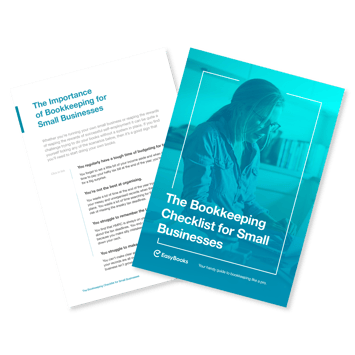Producing invoices, chasing payments, getting you ready for tax deadlines and processing payroll. These are just some of the things bookkeepers do for small businesses. Find out more in this blog.
- Day to Day Management of Accounts
- Maintain Up-to-Date Records
- Keep Businesses Aligned With Laws
- Keep You Prepared for Tax
- Manage Bank Feeds
- Handle Accounts Payable
- Send Out Invoices and Manage Accounts Receivable
- Prepare Financial Statements
- Process Payroll
- Deal With Foreign Currency Transactions
- Perform Stocktake
- Keep an Eye on Cash Flow
- Preparing the Books For an Accountant
- Do I Need a Bookkeeper For My Small Business?
1. Day to Day Management of Accounts
A bookkeeper can stay on top of your business’ accounts daily for all transactions. By keeping track of every sale or purchase and using software to do it all, it’s much easier for them to keep an eye on your cash flow.
Plus, it saves plenty of data entry time.
2. Maintain Up-to-Date and Accurate Records
A bookkeeper will make sure that all of your business records are up-to-date. Plus, it’ll be their job to flag up any inconsistencies between the books and your business accounts, making sure you resolve problems quickly.
3. Keep Businesses Aligned With Laws
Tax can be a sensitive area. One mistake and a dreaded letter from HMRC can soon be on your way. That’s where bookkeepers come in, as they can help make sure your business stays aligned with the relevant laws.
Remember, they’re here to help and not cause more significant problems.
4. Keep You Prepared For Tax
Like the laws and regulations, tax deadlines are quite strict as well. Doing the books is usually never the priority for many small businesses, so deadlines can slip under the radar. To keep the taxman happy and stop you from paying any additional fines, a bookkeeper will make sure your records are accurate, so you’re always prepared for tax.
5. Manage Bank Feeds
At a basic level, bookkeepers manage transactions brought in through software, like an app. Bank feeds, that link the software with your business bank account, allow you to see each transaction in real-time.
6. Handle Accounts Payable
It’s usually bookkeepers who make payments on behalf of your small business. This can include anything from payment of supplier invoices, petty cash and expenses.
7. Send Out Invoices and Manage Accounts Receivable
Another big responsibility of bookkeepers is that they prepare invoices and send them to your clients so you can receive payment on time. Managing the accounts receivable ledger is also likely to be done by a bookkeeper - as well as chasing up late payments so your records are always accurate.
8. Prepare Financial Statements
Bookkeepers will also be responsible for preparing some significant financial statements for small businesses. These can include a profit and loss statement, balance sheet and cash flow statements.
These financial reports show a businesses bottom line and operating expenses, the balance of assets and liabilities as well as the cash flowing in and out of the business.
9. Process Payroll
The services bookkeepers offer can vary. Some can fulfil payroll and other HR functions for small businesses. This can include assisting businesses with the processing of paychecks and tax payments to employees.
10. Deal With Foreign Currency Transactions
Bookkeepers also make sure to maintain accurate foreign currency accounts, utilising current exchange rates. This can be made much easier with compatible digital bookkeeping apps that can instantly analyse exchange rates without wasting much time.
11. Perform Stocktake
For small businesses, bookkeepers also produce inventory reports by counting stock items. If there are any discrepancies, they report back to the business to make sure you can address problems quickly.
It’s most commonly carried out at the end of a business’ financial year end with the figures featuring in reports such as profit and loss statements.
12. Keep an Eye on Cash Flow
One of the most essential tasks a bookkeeper will do for a small business is making sure they don’t run out of day-to-day money. They can do this by keeping an eye on the balance of revenues to expenses, along with offering more advice if the business needs more available cash to operate.
13. Preparing the Books For an Accountant
It’s a bookkeeper’s job to make sure that the accounts are valid and up-to-date when the accountant needs them. This lets an accountant use their knowledge to make business recommendations and complete any tax returns.
Do I Need a Bookkeeper For My Small Business?
In short, yes. However, all of the things we’ve mentioned above don’t necessarily mean you need to outsource to a professional. While it sounds like hard work, it’s quite straightforward when you know what you’re doing.
By reading up on bookkeeping, taking advantage of free workshops and webinars by HMRC or even learning hands-on with a digital bookkeeping app, you can see that it’s something you can do for your business quite easily.
See How Easy It Is to Do Your Books With Your Very Own Checklist
When you know which accounts to track and have the right tools in place, bookkeeping can be a breeze and not a headache. To help you get started on your journey and see how easy it is, we’ve created a handy checklist you can refer to along the way.
It’s packed full of useful tips on how to get started, how to maintain the books and what to look for when choosing the right software to meet the Making Tax Digital (MTD) initiative. Get your free copy using the link below.








